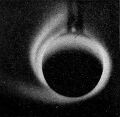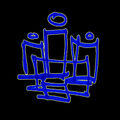Template:Selected anniversaries/June 14: Difference between revisions
No edit summary |
No edit summary |
||
| Line 63: | Line 63: | ||
File:Edward Lorenz.jpg|link=Edward Lorenz (nonfiction)|1966: Mathematician [[Edward Lorenz (nonfiction)|Edward Lorenz]] uses [[scrying engine]] to reveal previously unknown [[crimes against mathematical constants]]. | File:Edward Lorenz.jpg|link=Edward Lorenz (nonfiction)|1966: Mathematician [[Edward Lorenz (nonfiction)|Edward Lorenz]] uses [[scrying engine]] to reveal previously unknown [[crimes against mathematical constants]]. | ||
||1968: Asteroid 1566 Icarus ... came as close as 0.042482 AU (6,355,200 km), or 16 LD. During this approach, Icarus became the first minor planet to be observed using radar, with measurements obtained at the Haystack Observatory and the Goldstone Tracking Station. Pic. | |||
File:Jorge Luis Borges.jpg|link=Jorge Luis Borges (nonfiction)|1986: Short-story writer, essayist, poet and translator [[Jorge Luis Borges (nonfiction)|Jorge Luis Borges]] dies. His best-known books, ''Ficciones'' (''Fictions'') and ''El Aleph'' (''The Aleph''), published in the 1940s, are compilations of short stories interconnected by common themes, including dreams, labyrinths, libraries, mirrors, fictional writers, philosophy, and religion. | File:Jorge Luis Borges.jpg|link=Jorge Luis Borges (nonfiction)|1986: Short-story writer, essayist, poet and translator [[Jorge Luis Borges (nonfiction)|Jorge Luis Borges]] dies. His best-known books, ''Ficciones'' (''Fictions'') and ''El Aleph'' (''The Aleph''), published in the 1940s, are compilations of short stories interconnected by common themes, including dreams, labyrinths, libraries, mirrors, fictional writers, philosophy, and religion. | ||
Revision as of 15:39, 7 March 2019
1791: Polymath Charles Babbage proposes a difference engine in a paper to the Royal Astronomical Society entitled "Note on the application of machinery to the computation of astronomical and mathematical tables".
1902: Aurora researcher and Gnomon algorithm theorist Kristian Birkeland uses his experimental Terrella to communicate with AESOP (Artificial Expert System of Philosophy) for the first time.
1903: Mathematician and logician Alonzo Church born. He will make major contributions to mathematical logic and the foundations of theoretical computer science.
1946: Engineer and inventor John Logie Baird dies. He was one of the inventors of the mechanical television.
1966: Mathematician Edward Lorenz uses scrying engine to reveal previously unknown crimes against mathematical constants.
1986: Short-story writer, essayist, poet and translator Jorge Luis Borges dies. His best-known books, Ficciones (Fictions) and El Aleph (The Aleph), published in the 1940s, are compilations of short stories interconnected by common themes, including dreams, labyrinths, libraries, mirrors, fictional writers, philosophy, and religion.
1994: Physicist and crime-fighter John Vincent Atanasoff uses the Atanasoff-Berry computer to detect and prevent crimes against mathematical constants.
1995: Writer Roger Zelazny dies. He won the Nebula award three times, and the Hugo award six times.
1995:The Custodian offers supernatural crime fighter job to deceased writer Roger Zelazny.
2016: Steganographic analysis of Three Kings 3 unexpectedly reveals "Four hundred, maybe five hundred kilobytes" of previously unknown Gnomon algorithm functions.









